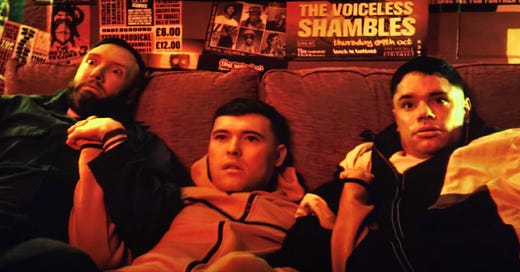
Kneecap (2024)
Written and directed by Rich Peppiatt
Co-written by the members of Kneecap
Excuse the weird-looking perspective in the image above, but the IMDB site where I usually find publicity stills that I can use in a review offers up a single image for “Kneecap.” A lot of these small indie movies don’t bother with decent publicity stills, and knowing this, I take pictures in the theater, where the screen distorts the image. Best I could do.
But my commando (and frankly forbidden) photography is in the spirit of “Kneecap,” which is a sort of biopic or fictionalization about the career of a hip-hop group that has become celebrated in its Belfast home for rapping entirely in the Irish language. The group is a real group, and the members play themselves quite easily and convincingly, enacting scenes from their history, some made up and some that really happened.
For example, it is true (according to an article I read) that JJ Ó Dochartaigh really was a teacher in an Irish language school; these were founded in the 1970s and onward when the people of Northern Ireland, in a show of pride in their culture, began to recapture their native language. In addition, as an early scene shows, speaking only Irish to the cops was a way to get them really worked up. It’s also true, as shown in the film, that Ó Dochartaigh was fired from his teaching post after he mooned a concert audience from the stage, revealing the words BRITS OUT written on his butt.

The main thrust of .the film is not only to show how the group began, discovered their voice, and became popular, but also to suggest that the reason they became big was that performing in Irish (and attending their shows) was felt to be an act of defiance. The movie ties this sentiment to a campaign to legalize the Irish language as an official secondary tongue of the UK, which had already recognized Scottish and Welsh.
Was Kneecap — named after a violent practice of Irish rebels in the 70s onward — really the only group rapping in Irish upon their debut? Did they invent, in other words, Irish-language hip-hop, as the film suggests? I have no idea, but such a generalization wouldn’t be unusual for a movie like this, where drama depends upon the audience’s belief that the characters they’re watching are singularly clever and brave.
Other plot elements are bound to be fiction: that Naoise Ó Cairealláin’s father (Michael Fassbinder) was an IRA soldier on the run from the British for twenty years; that the reason JJ Ó Dochartaigh, the teacher, wore a balaclava on stage was to hide his identity from his students; that he had a wife who was a central figure in the campaign to promote Irish; and that the chief police official (Josie Walker) in charge of capturing the senior Ó Cairealláin had a daughter (Jessica Reynolds) who carried on a secret and quite athletic sex life with Liam Óg Ó Hannaidh.
Whether or not something in “Kneecap” is fictional doesn’t matter a bit, frankly, because the performances by the members of the group, playing themselves, are natural and enjoyable and quite comic. Director Rich Peppiatt keeps the pace madcap throughout. While the film occasionally nods to the period of the Troubles and to the still contemptuous relationship between the Belfast working class and the British cops, it never gets bogged down in a history lesson. Historical facts are doled out sparingly and only when the characters have cause to refer to them.
Note that the movie is in both English and in Irish, and only the latter is subtitled. That means an American viewer loses quite a lot during the first twenty minutes or so until she gets used to the patois, but the action is generally so funny that you stick with it.


